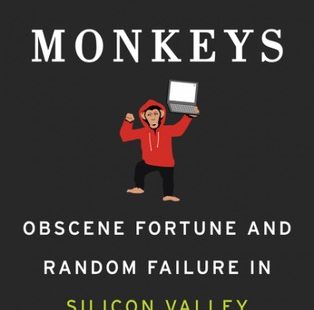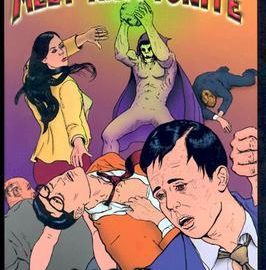Disclosure: I may earn affiliate revenue or commissions if you purchase products from links on my website. The prospect of compensation does not influence what I write about or how my posts are structured. The vast majority of articles on my website do not contain any affiliate links.
Chaos Monkeys: Obscene Fortune and Random Failure in Silicon Valley by Antonio García Martínez
Rating: ★★★★★
Date Finished: December 1st, 2017
Reading Time: Ten days; Audible
Liar’s Poker—remember that book? I wonder how it was received in 1989. It’s now considered a classic and is gleefully passed around summer training classes. It’s the North Star in a constellation of Wall Street memoirs spanning from Reminiscences of a Stock Operator (1923) to Straight to Hell (2015). I’ve spent many a night gazing into this galaxy, exploring some celestial objects that are little more than dimly lit orbs of gaseous matter.
In Liar’s Poker, which is one of about four Wall Street books that anyone should ever consider reading twice, Michael Lewis (who is now a respected American novelist) details his experience during the glory days of Salomon Brothers, an investment bank that specialized in bond trading. Lewis wrote astutely of everything from his days in training class (which is probably why new recruits find the book so charming) to the big swinging d****s (high performers) who roamed the trading floor, to the game that is the book’s namesake.
Through all of this, Lewis was on the sidelines. In fact, he might have only been in New York for summer training and spent the rest of his time in London. He had no importance to the story—and an endearing criticism of the book is that he was just a snarky little twentysomething who ended up writing what was, to 1980s Wall Street, received as if it were tabloid journalism.
Many have tried and failed to capture the magic of the company exposé like Michael Lewis did. Dan Lyons wrote Disrupted, which was about his time at Hubspot, in a similar vein, but it was nothing compared to Liar’s Poker. As soon as it becomes obvious that someone is sticking around just for the story, some of the magic is lost. So one must walk a fine line when writing a Liar’s Poker.
Antonio Martinez goes overboard on a few occasions, but he’s come closer than anyone else to writing the Liar’s Poker of Silicon Valley. And this is not an easy thing to do. Michael Lewis himself attempted to write the Liar’s Poker of Silicon Valley. It was called The New New Thing and was published in 1999. It’s now embarrassingly dated and has been relegated to the lowest quartile of Lewis’ published works ranking. There is a parallel between the excesses of 1980s Wall Street and late 90’s Silicon Valley, but the book was forgettable. It didn’t read the same way that Liar’s Poker did.
Michael Lewis failed to write the Liar’s Poker of Silicon Valley. Why did we have to wait seventeen years for a quant to come along and commit career suicide with the goal of delivering it?
First and foremost, Antonio Martinez knows what he’s talking about. He’s exceptionally well-read, smart, ambitious, and has high emotional intelligence. One of my favorite thing to do is bust phonies like Tai Lopez who claim to be voracious readers and aren’t. Faced with mountains of well-selected quotes, tight editing, and advanced vocabulary, I believe Antonio when he says he spent his childhood in the library. He convinced me to read Meditations with one great quote selection. This gives him significant credibility as a narrator and affords him some room to make derisive statements, such as calling Nassim Taleb a pseudo-intellectual.
Antonio knows what he’s talking about because he followed the noble path of starting as an engineer before transitioning to project management. During these years, he was at the forefront of advancements in the ad space. He knew the business so well and was able to seamlessly describe what was going on. Unlike Wall Street, which always is accompanied by a murky foreboding, the implications of digital ad technology are both very real and very easy to understand. He did a wonderful job explaining his industry, his role in the industry, and the valley as a whole.
So, why isn’t this book considered a modern classic?
We’ll start with a softball. Character development is poor compared to a Lewis book. Mark Zuckerberg and Sheryl Sandberg: we know them. A few others: geeks like me know them. The other actors are hard to connect with because Antonio’s narration style is overwhelming. Saying he’s an egoist might be a stretch, but he remained the center of attention throughout. Also, the monikers ‘British Trader’ and ‘Israeli Psychologist’ were ill-conceived. To me, those are two of the worst countries to use as descriptors because there’s no consistency in the mental images readers will generate. The only character I really remember is the CMU football player, but only because the guy who sits next to me at work also played there, also studied engineering there, and shares some facial features.
When it comes to storytelling, Antonio is talented, but he and Michael Lewis apply their wit differently. On one hand, it’s a wildly fun read. On the other hand, it sacrifices the potential for cultural longevity to appeal to what people like me want to read right now. Will people be reading Tucker Max in ten years? Shenanigans are funny, but unless you’re a master of the craft, it’s hard to phrase these things timelessly (not to suggest Antonio was trying to be timeless, or that timelessness is even a goal worth pursuing when writing a memoir). To that point, the DUI incident and reckless driving were kind of dumb.
Generally, the way Antonio discusses his relationships women will be perceived as politically incorrect. I don’t care. But the flippancy of it all irked me. His relationship with British Trader leading to the birth of their first child fit into the story well, but after that it became haphazard. The reader is left without any real comprehension of the nature of Antonio’s relationships with women or his children. And if all of this irked me, there is no doubt that it’s the main reason the book has been rebuked within certain circles. Antonio could never have predicted popular opinion moving so harshly against the alpha male, but more prudence would have gone a long way here.
Liar’s Poker was meant to serve as a warning; it’s remembered for being an arousal. Chaos Monkeys was intended to be an electrifying, divisive, no-holds-barred memoir. It will be remembered as an electrifying, divisive, no-holds-barred memoir.
See this review and others at Goodreads.com




